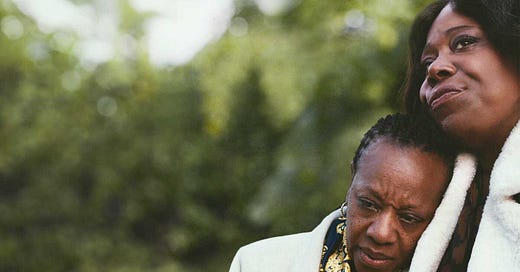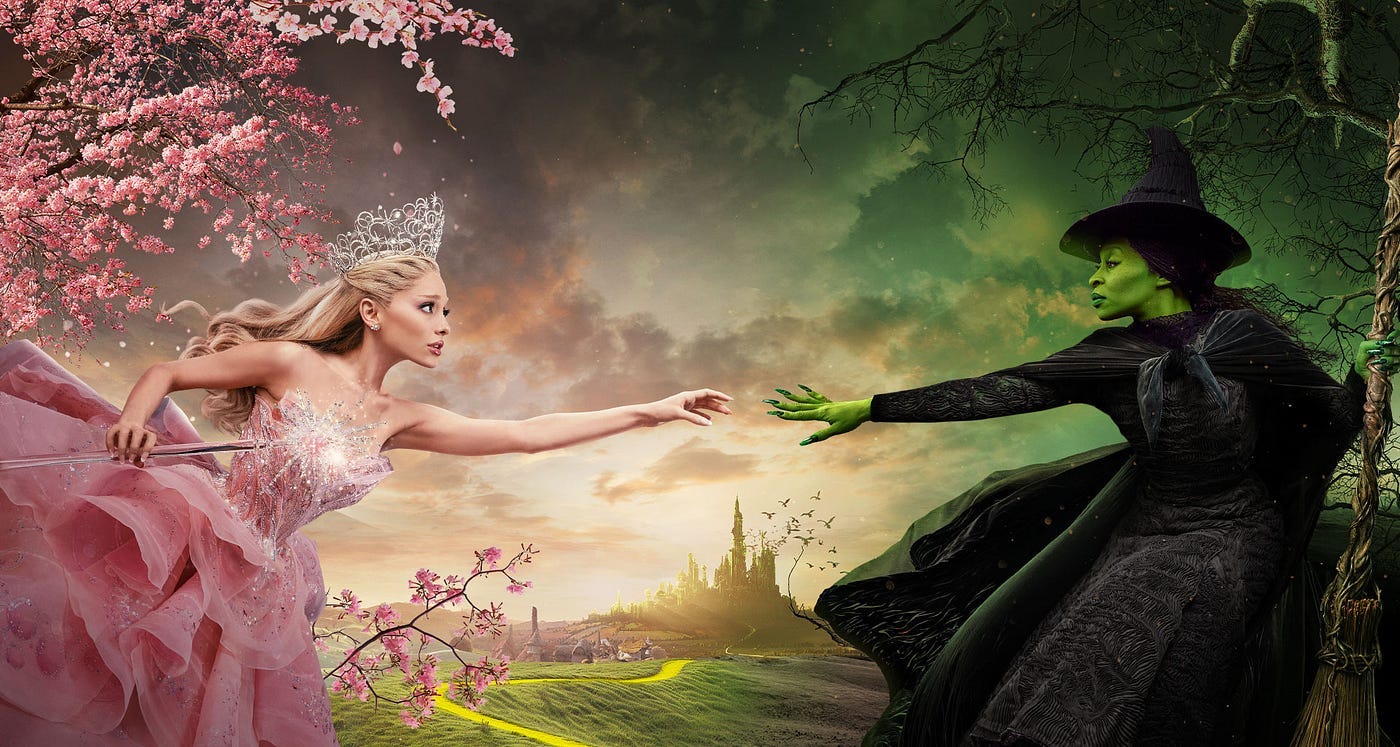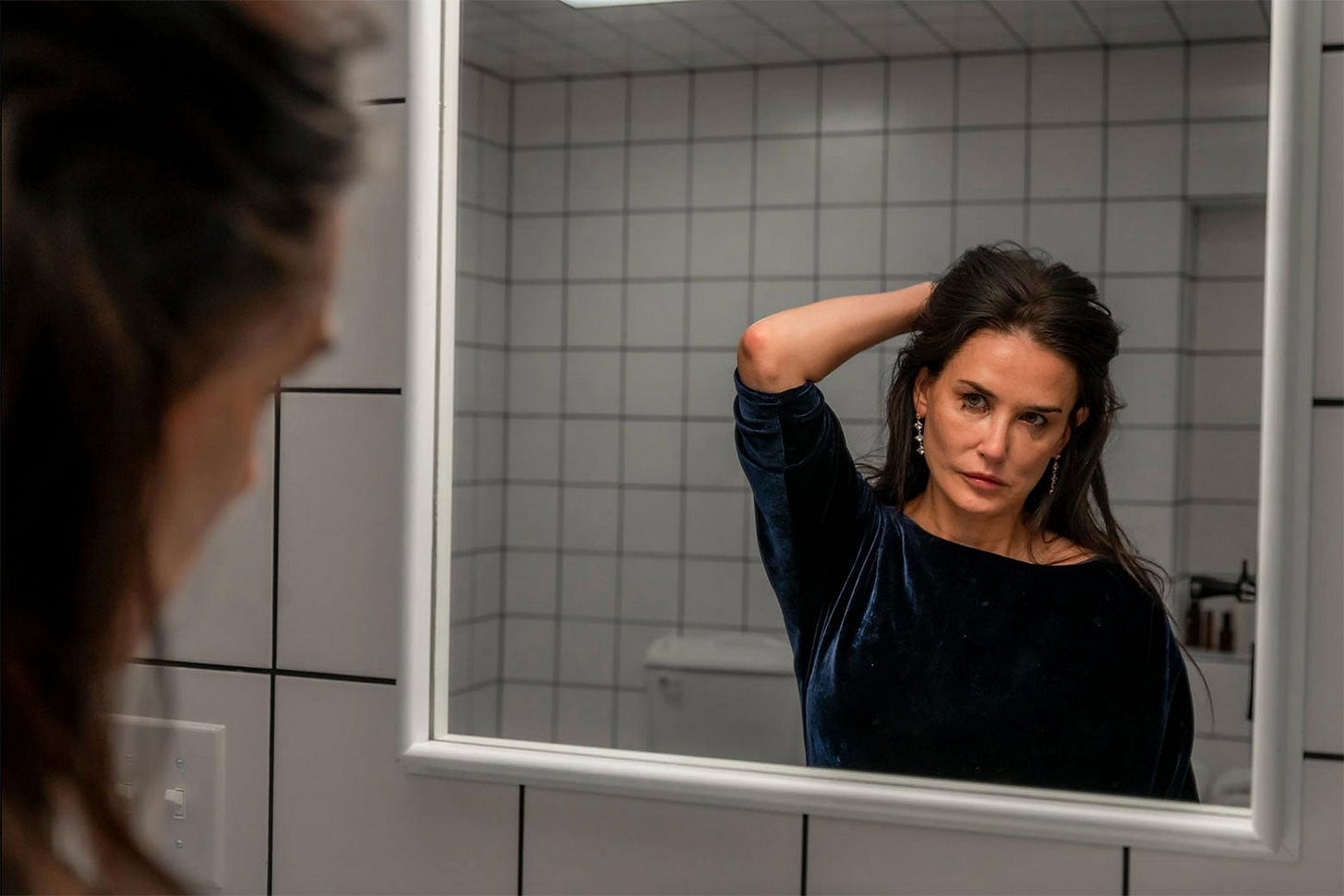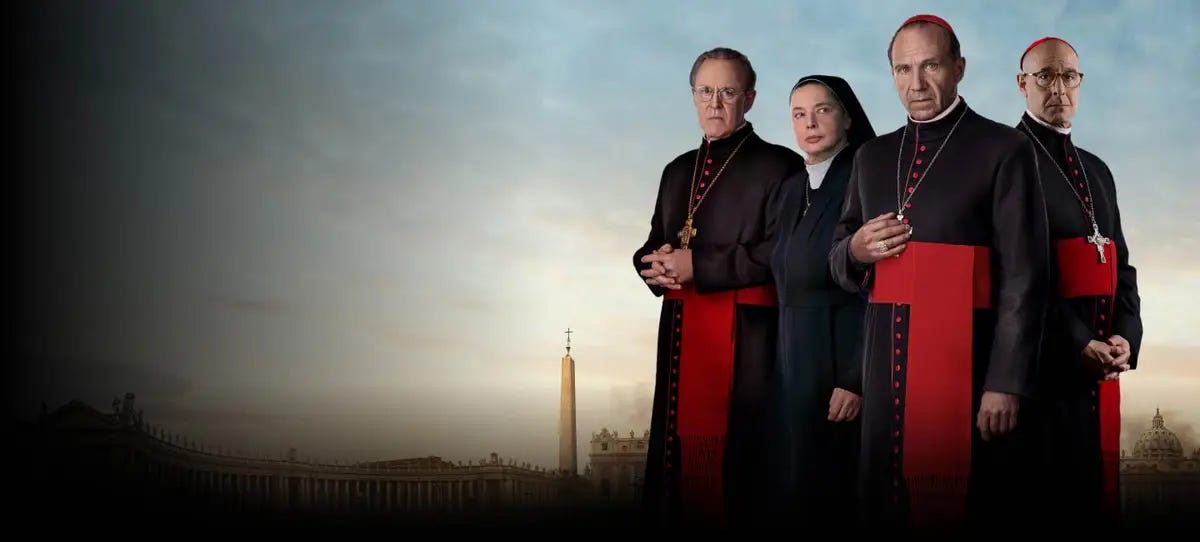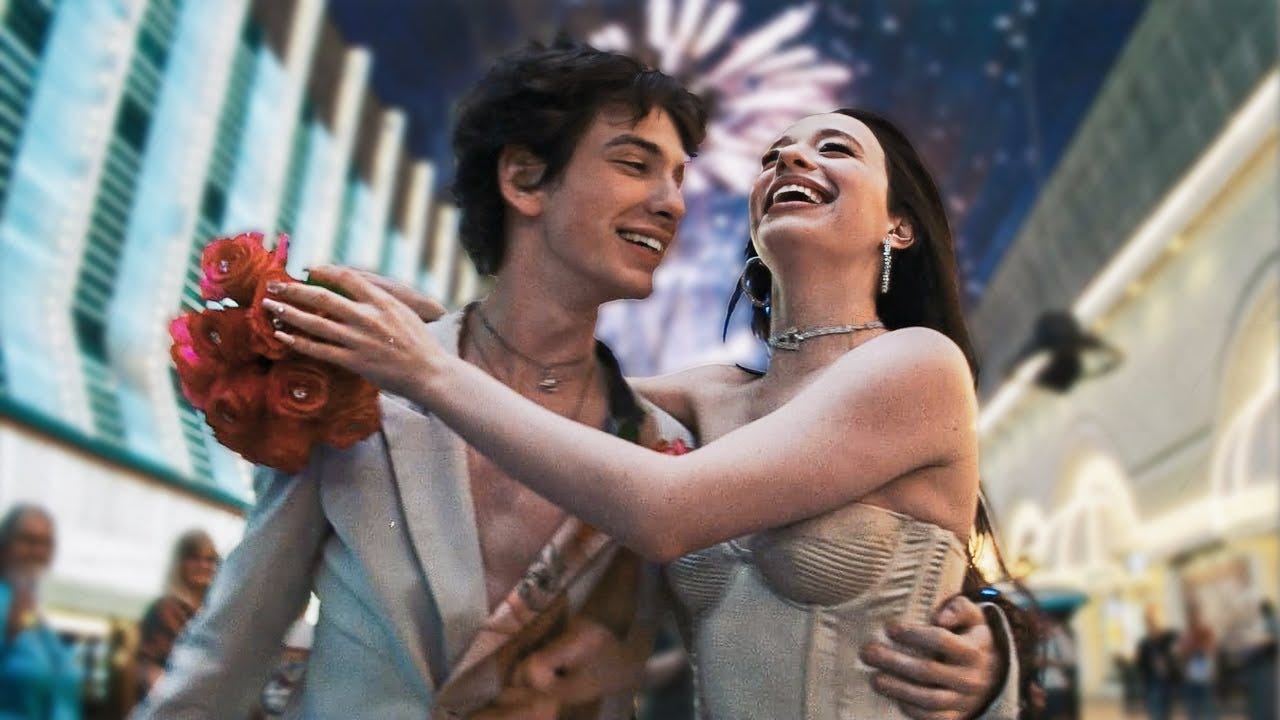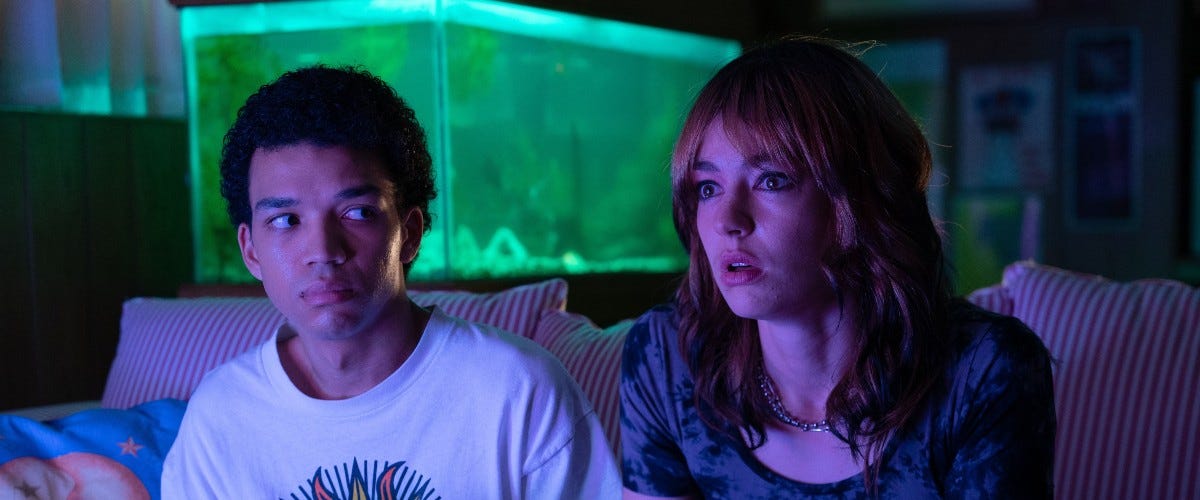The only two new release films I watched during the last calendar year were Beverly Hills Cop 4 (I think I wrote about that somewhat here but I’ll be goddamned if I even remember) and Richard Linklater’s Hitman. In the last month and change, however, in the wake of the Oscar nominations and the upcoming Independent Spirit Awards (for which I am a voter), I’ve finally started covering the cinematic ground of the last 12-plus months.
What follows are some brief thoughts on the biggest things I’ve watched recently.
Hard Truths
At first I found myself struggling with how overly-rehearsed and theatrical I found the dialogue scenes to be here - they felt artificial in a way Lee’s films never do. The invective that Marianne Jean Baptiste’s Pansy spews is beautiful and she delivers it incredibly - this is such a stunningly designed and executed character - but there were so many scenes where people just kind of stand there and let her go on. That plays when it’s the family that has been worn to a nub, not as well at other times. But where this really shined was in the silences, few and far between in the first half before things shift in the second, where Mike Lee fully reveals just what exactly he’s doing here in a way that completely floored me.
I don’t think I’ve ever seen a movie spend its first half making a character so overwhelmingly unpleasant and unlikable only to reverse sympathies so completely and effectively in the second half. A total magic trick. And what’s more, it does so without revealing anything about her - it’s all through incident and interpersonal relationships and body language, even in the way that Pansy becomes less of a dramatic construction built to deliver monologues and more of an internalized human character. That’s where the film truly excels, the last 45 minutes or so reveling in the most loaded and uncomfortable silences, and in its excavations of the distances carved between loved ones and within ourselves over time.
Wicked
I’m a big fan of musicals, and the splashier and gaudier the better1, but I found this to be a bloated and indulgent slog. How can something so expensive look so cheap? How can so little of consequence happen in three hours? I felt like Elaine Benes watching the English Patient - this is so incredibly drawn out and free of major incident until its last half hour, in which it crams in every development it can. Why on earth is this two movies? (Smash cut to a studio fat cat running over the horizon with two comically giant bags of money)
Maybe CGI should be illegal. There is a template for making a big expensive studio movie look distinct and tangible. Look at how good something like Barbie looks - another super expensive franchise IP cash cow that is heavily stylized and making a lot of big choices - and then look at this. You’re dealing with some of the most classic iconography in film history and your movie looks this dull?
The cast is mostly innocent - Erivo and Grande are great and they complement each other really well even though they’re utilizing very different performance styles. Goldblum’s a hoot as always - the movie finally comes alive when he shows up as the Wizard towards the end, and he sells the whiplash-inducing heel turn the character takes almost immediately. There are some good moments, the best being the sequence in which Glinda and Elphaba finally become friends during a dance off in an Oz nightclub (better than it sounds). But it’s also both the most washed-out and muddiest movie I’ve seen in a while. Half of it looks like they forgot color grade from the raw log footage, and the rest is a hopelessly muddy pool of digital sludge. Defying Gravity is such a strong number that it manages to (mostly) work here even though the filmmaking does all it can to hamstring it.
Tiffany is a huge fan of the original show. Halfway through this she started falling asleep and told me I could finish it on my own.
Emilia Pérez
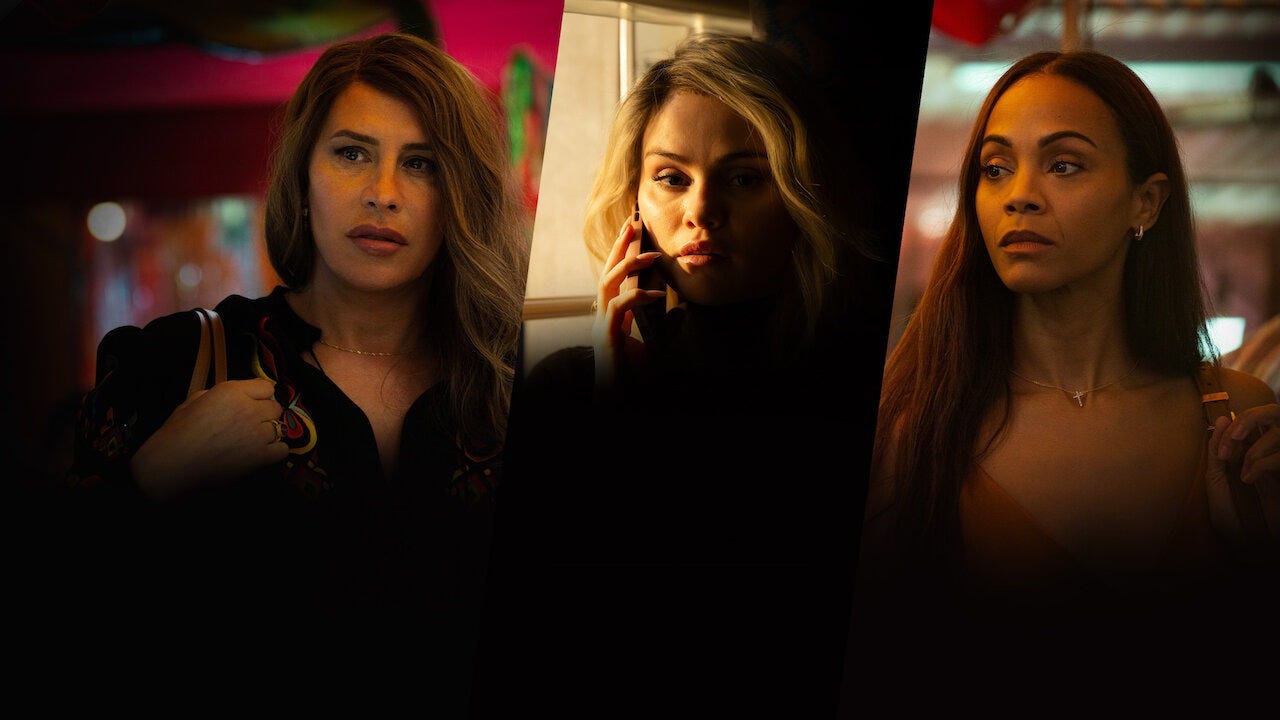
What if a straight guy tried to make an Almodovar movie?
The other bafflingly ugly major musical of this year. I love it when a movie takes big swings; I’m even at a point in my life when I tend to think interesting is better than good. But I don’t think the swings this movie takes are all that big - I actually think it plays things incredibly safe by making itself an opera that is 1) not sung through and also 2) visually flat and uninteresting. The decision to shoot on soundstages opens up the possibilities of a wildly imaginative elseworlds version of Mexico City, but what we get instead is something that looks like it takes place in redressed warehouses. Why not open it up and make it stylized and gaudy rather than this visually boring? The reason, it seems, is that the movie so desperately wants to be ABOUT something, which is always a kind of death for any film even removed from the fact that this one also doesn’t seem to know what it wants to say. It’s all over the place and not in a way that’s particularly invigorating. I am also by no means an authority on the trans experience, but this feels a good 20 years behind the times in that respect.
When it started I thought to myself, “Okay, they’re doing the thing where it’s a musical but nobody can sing and the songs aren’t very catchy” but I eventually realized that, even worse, this was pitched as an ungodly amalgamation of The Umbrellas of Cherbourg, Narcos, and, well, a Jacques Audiard movie. Which sounds very exciting on paper, but on screen is a giant whiff because it’s not willing to really “go there.” It’s an operatic melodrama that tries to play against the opulence of either of those things, and on top of that tries to be an “issue move” in a way that ends up being woefully bourgeois. This was already well-positioned to win Best Picture without much competition given how much the industry seems to love it; the online backlash has all but assured it.
The Substance
Here we have, by contrast, a movie that not only genuinely takes some big swings but also has the courage of its convictions to follow them to their most extreme possible end points. And no matter how big the choices, they work because they remain centered on a thematic core that is so direct and unambiguous. This coupled with the simplicity of the narrative - an aging actress takes a mysterious concoction that causes a younger alternate self to spawn from her body so that she can in effect re-start her career - supports an aesthetic approach that is unrelenting. It’s fish-eye compositions exaggerate the leering faces of all the venal men that ogle both versions of Elizabeth Sparkle, pulling them closer to the camera and giving us the sense that the world itself is looming over and wrapping itself around us as well; the intra-scene edits of the dialogue scenes unseat our perspective so rapidly that we feel constantly on edge; the outlandish gore effects build to a finale that is as ludicrous as it is disturbing and, ultimately, touching. Coralie Fargeat has made the kind of film that unsettles and moves us in equal measure - no easy feat.
True, it’s not particularly subtle but maybe subtlety isn’t the way to deliver a message that is as consistently ignored as it is obvious to anyone who pays attention. It also earns, pretty easily, the distinction of being far and away the most disgusting movie ever nominated for major Oscars, and I mean that as the highest compliment.
Conclave
Conclave is an enjoyable and refreshingly adult movie for the most part, though it plays it pretty safe before devolving into some rather poe-faced silliness in its conclusion. 30 years ago a thriller about choosing a new pope would be a made-up movie that the characters on Seinfeld were all trying to see; in today’s arid multiplex climate it’s being greeted as a breath of fresh air. It’s engrossing enough, beautifully shot with some great performances, but the relevance is at times a little strained and it doesn’t quite have the courage to be as silly as the material demands. A decision of massive spiritual and geopolitical importance being made by a roomful of catty little men in silly frocks should be fodder for a more incisive and biting work; this version of things tries so hard to lend an air of grave importance to the proceedings that it ends up vacuum sealing itself against any of the messy humanity that would contrast the precise formalism and really make this sing.
Anora
The American Dream isn’t dead, it’s just a spoiled Russian shitson who can’t look mommy in the eye when she’s angry, and we’re all just his plaything.
An exhilarating stylistic mash-up of Baker’s neorealist-adjacent approach with the genre conventions of screwball comedy/chase movies, tinged with heavy melancholy. A sex worker gets whisked into a marriage with a Russian oligarch’s son, taken in by the promise of an escape from her own life, only for the fantasy to come crashing down when Daddy’s goons find out and try to put a stop to it. Prince Charming runs off, leaving her behind to help his handlers find him in time to get him before a judge and annul the marriage before mommy and daddy touch down in their private jet to whisk him back to the motherland.
This is in its way about how the illusion of upward mobility draws those who chase it into its flame only to burn them up and spit out the ashes, and yet it’s so much more enjoyable than that makes it sound. This feels like the natural continuation of the kinds of movies Hollywood made regularly in the 70s - movies that are so entertaining that you don’t realize how sad they actually are until they have, by their end, burrowed deep into an undeniable tragedy at the heart of modern American life. The performances are also uniformly incredible - maybe the ensemble of the year.
I Saw the TV Glow
There was a time in my life when I felt like all I had were the shows and movies that I loved. This movie depicts like no other the fear, sadness, and horror that can reveal itself at the center of that kind of relationship with media: the feeling that there’s a world beyond the one you know but to which you’ll never be able to escape, a life truer than your own that you’ll nevertheless remain unable to live - be it due to inaccessibility or fear or whatever else may hold you back. Those of us who are lucky find our way. I was not prepared for the slow, self-inflicted death of a soul suffered herein by a character who could not.
It should come as absolutely zero surprise that Schoenbrun was just a few weeks ago on a podcast discussing the last four episodes of Twin Peaks: The Return; like Lynch’s opus, their film burrows its way in as few others have in recent memory, with an ending that is absolutely devastating. It also speaks to a fundamental universality at the deepest core of the trans experience in such a visceral way that it puts to even further shame those who would judge or demonize anyone for simply desiring to live as themselves.
I have seen very few movies from the last year; it seems unlikely that this will be surpassed as my favorite.
-cs
Keep this in mind for the next entry as well.

